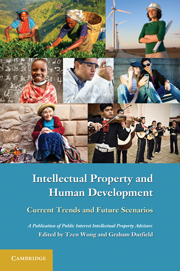Book contents
- Frontmatter
- Contents
- Boxes
- Contributors
- Foreword
- Preface
- Acknowledgements
- Acronyms and abbreviations
- Overview
- 1 Intellectual property through the lens of human development
- 2 Intellectual property and medicine: Towards global health equity
- 3 Food security and intellectual property rights: Finding the linkages
- 4 Trends and scenarios in the legal protection of traditional knowledge
- 5 Traditional cultural expressions: Preservation and innovation
- 6 Copyright and capability for education: An approach ‘from below’
- 7 Knowledge and education: Pro-access implications of new technologies
- 8 Cultural diversity and the arts: Contemporary challenges for copyright law
- 9 Scenario planning on the future of intellectual property: Literature review and implications for human development
- Appendix A Capability, opulence and utility1
- Appendix B Exploring alternative, collaborative models of innovation for medicines and vaccines1
- Appendix C Strategies and laws to promote traditional medicinal knowledge1
- Appendix D Educational use exceptions to copyright: A comparison among selected jurisdictions1
- Appendix E Copyright and contemporary art: A case study
- Index
- References
6 - Copyright and capability for education: An approach ‘from below’
Published online by Cambridge University Press: 05 June 2012
- Frontmatter
- Contents
- Boxes
- Contributors
- Foreword
- Preface
- Acknowledgements
- Acronyms and abbreviations
- Overview
- 1 Intellectual property through the lens of human development
- 2 Intellectual property and medicine: Towards global health equity
- 3 Food security and intellectual property rights: Finding the linkages
- 4 Trends and scenarios in the legal protection of traditional knowledge
- 5 Traditional cultural expressions: Preservation and innovation
- 6 Copyright and capability for education: An approach ‘from below’
- 7 Knowledge and education: Pro-access implications of new technologies
- 8 Cultural diversity and the arts: Contemporary challenges for copyright law
- 9 Scenario planning on the future of intellectual property: Literature review and implications for human development
- Appendix A Capability, opulence and utility1
- Appendix B Exploring alternative, collaborative models of innovation for medicines and vaccines1
- Appendix C Strategies and laws to promote traditional medicinal knowledge1
- Appendix D Educational use exceptions to copyright: A comparison among selected jurisdictions1
- Appendix E Copyright and contemporary art: A case study
- Index
- References
Summary
You Don't Remember…but She's With You was a very emotional quilt for me to create. Making the quilt helped me deal with the loss of my mother when my younger son was still very small. She loved reading, loved to see children read and helped many children and adults to learn. I know she is watching as her grandchildren grow. I tell my son about her keen intellect, how proud she would be of his love of books and learning and, above all, that she is still with him. (Austin 2006)
Printed books require no mediating device to read and thus are immune to technological obsolescence. Paper is also extremely stable, compared with, say, hard drives or even CDs. In this way, the stability and fixity of a bound book is a blessing. It sits there unchanging, true to its original creation. (Kelly 2006, p. 46)
Introduction
Global intellectual property regimes reflect a top-down approach to global intellectual property regulation, following from the interests and needs of intellectual property-rich states (Arewa 2006, pp. 79–80). This approach fails to generate the full range of policy choices for both developed and developing countries to maximize global social welfare with respect to human development needs such as education. To address this bias, I propose an approach of intellectual property (hereinafter IP) ‘from below’, which links IP to distributive justice and human development. The term ‘from below’ also dovetails with the term ‘Global South’ that is increasingly being used to denote that subset of developing countries that are located primarily below the equator and also below the median in terms of development indicators, whether measured by Gross National Income or the Human Development Index (see United Nations Development Programme [UNDP] 1990, p. 1; 1991, p. 2). This approach responds to the imbalance that observers in both the North and the South are identifying in both domestic and global IP policymaking settings.
In this chapter I first describe the approach from below and introduce ‘development’ as a key term of art in global IP. Employing a method from below, I then sketch the lack of access to basic educational materials in many developing countries, both descriptively and with respect to the copyright dimension. In the context of building capacity for education, the term ‘development’– if taken seriously – should result in a mechanism for access by users to knowledge goods for education. For many countries, both developed and developing, books remain an appropriate and useful technology, especially for primary and secondary education. Just as the digitizing of books is allowing us to re-imagine our global digital informational universe, can access to hard copies for educational purposes be re-imagined? This chapter focuses primarily on Article 10(2) of the Berne Convention, the so-called illustration for teaching exception, which endorses national exceptions to copyright for purposes of access to education. Of course, copyright is only one of several factors affecting the provision of textbooks (Farrell & Heyneman 1988, pp. 33–39). However, it is a significant one and deserves more scrutiny in this particular context.
- Type
- Chapter
- Information
- Intellectual Property and Human DevelopmentCurrent Trends and Future Scenarios, pp. 218 - 249Publisher: Cambridge University PressPrint publication year: 2010
References
- 2
- Cited by



